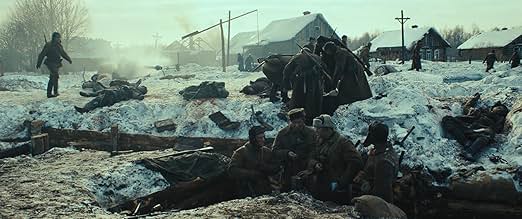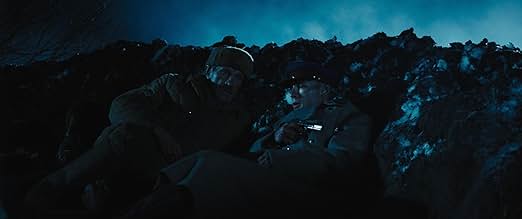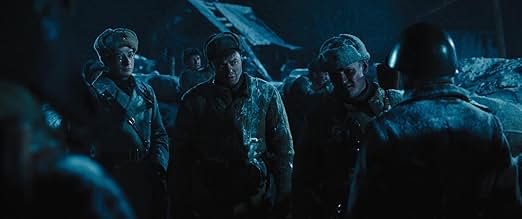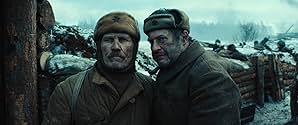IMDb RATING
6.1/10
1.4K
YOUR RATING
In the winter of 1942/1943, a series of not-so-well known, yet bloody battles occurred near the town of Rzhev. Those battles received the name of 'Rzhev Meat Grinder'. The film is based on t... Read allIn the winter of 1942/1943, a series of not-so-well known, yet bloody battles occurred near the town of Rzhev. Those battles received the name of 'Rzhev Meat Grinder'. The film is based on the award-winning novel by Vyacheslav Kondratyev.In the winter of 1942/1943, a series of not-so-well known, yet bloody battles occurred near the town of Rzhev. Those battles received the name of 'Rzhev Meat Grinder'. The film is based on the award-winning novel by Vyacheslav Kondratyev.
- Director
- Writers
- Stars
- Awards
- 1 nomination total
Daniil Voropaev
- Sgt. Lavrov
- (as Danila Voropaev)
- Director
- Writers
- All cast & crew
- Production, box office & more at IMDbPro
Featured reviews
The opening battle scene was good but suffered from war movie clichés, like having a guy drag another to safety only to find half his body missing. They also have those stock characters, the scavenger, the harsh Commissar, and the heroic, square jawed commander. But as the movie progresses, the actors settle into their roles. The commander is especially likable.
The movie is well structured. After the opening battle there is a tense pause before the German counter-attack. This gives the actors time to show us the state or the Red Army in 1942. We see the tension between the regular army and the Commissars. All war movies glam up battle scenes but it was less than a typical American production.
The behavior of the Commissars is portrayed negatively but we hear enough to understand why they identify so strongly with the state. This does not justify them but it lets you see them as humans who took a wrong turn. The Commissars have logical, if flawed, reasons for their decisions as their heavy handedness creates hostility. After a tense argument, a Commissar refuses to send help to a unit that just took a position, blurting out, 'whatever we send them will be a total loss'. He assumes the officer is being emotional but he is not allowing the army to prove what they could do given resources at critical times. I thought this interplay was well done but you have to look for it, this good writing.
They used the church imagery effectively. You see it wherever they went. You see them standing next to a wall decorated with icons and in a basement. Religious themes can feel forced but here it felt natural. Even the Commissars, famous for their atheism, chose to ignore its presence rather than fight it. You could see this going through their minds with one uncomfortable glance. The Church belonged there the Germans did not. When a German emerged from an Orthodox church at night with a flame thrower, it was chilling. It was as if they were assaulting the essence of the town.
The Germans were a better foil here than in American movies. In U. S. movies they are portrayed as evil but incompetent. This detracts from their seriousness. Here they are deadly and their presence is like a dark cloud.
Except for a few common war movie tropes, this was a very good movie.
The movie is well structured. After the opening battle there is a tense pause before the German counter-attack. This gives the actors time to show us the state or the Red Army in 1942. We see the tension between the regular army and the Commissars. All war movies glam up battle scenes but it was less than a typical American production.
The behavior of the Commissars is portrayed negatively but we hear enough to understand why they identify so strongly with the state. This does not justify them but it lets you see them as humans who took a wrong turn. The Commissars have logical, if flawed, reasons for their decisions as their heavy handedness creates hostility. After a tense argument, a Commissar refuses to send help to a unit that just took a position, blurting out, 'whatever we send them will be a total loss'. He assumes the officer is being emotional but he is not allowing the army to prove what they could do given resources at critical times. I thought this interplay was well done but you have to look for it, this good writing.
They used the church imagery effectively. You see it wherever they went. You see them standing next to a wall decorated with icons and in a basement. Religious themes can feel forced but here it felt natural. Even the Commissars, famous for their atheism, chose to ignore its presence rather than fight it. You could see this going through their minds with one uncomfortable glance. The Church belonged there the Germans did not. When a German emerged from an Orthodox church at night with a flame thrower, it was chilling. It was as if they were assaulting the essence of the town.
The Germans were a better foil here than in American movies. In U. S. movies they are portrayed as evil but incompetent. This detracts from their seriousness. Here they are deadly and their presence is like a dark cloud.
Except for a few common war movie tropes, this was a very good movie.
I have no idea why the 5.8 score exists for this film. It truly is bewildering. Apparently the people scoring this film low are either Soviet sympathizers, Nazi sympathizers, or hate realistic war films?
I don't know. The low score makes no sense to me.
What does make sense to me is that director Igor Kopylov crafts a fine film around one of the many pivotal battles that helped shape Russia's eventual victory over the Germans leading up to the battle of Stalingrad.
Ovsyannikovo was one of the many small strategic points in the battlefield that the Soviets needed to capture to push the Germans out. The film itself is just a small look at the many lives lost trying to capture and secure this small village.
The film does a fine job of not shying away from the brutal and sadistic nature of the Germans to secure victory (massacring and raping civilians) and then systematically wiping out opposing forces.
The film also does a fine job of making it known that some of the biggest hurdles the Russian army faced in the war was from Soviet leadership!
The bureaucracy and stupidity of the Soviets cost many great and brave men their lives. A central sub-plot to the film outlines how the already thinning company would lose additional soldiers over the most trivial and banal of things.
But this is what happened, and this is why so many Russians died during World War II (and thereafter during the reign of the Soviet Union).
As far story structure is concerned, the film mostly only centers around the men stationed Ovsyannikovo, with a few snippets of the commanding officers trying to justify their logic in not sending reinforcements or properly aiding their soldiers. I almost wanted to spit into the face of the commanders wasting he lives of these brave soldiers; that's just how engrossing the film had become.
But what's more is that all of this feels authentic. Kopylov makes the battles feel grounded and realistic for the most part, and some soldiers suffer shell shock, PTSD, delirium and panic attacks, just as you would expect under those conditions. The violence is also fairly visceral and realistic; the special effects team make use of both squibbing and CGI, so while those of you who may hate the look of CGI blood, there is still some squibbing effects that help highlight the realism of the gun battles.
Overall, it's a fascinating watch. Of course it's not as over-the-top and action-packed as T-34, but it is very similar to Kim Druzhinin and Andrey Shalopa's tightly hewn war-thriller, Panfilov's 28. Ignore the low rating, I'm not sure what's going on with that, but if you can find a way to view this film definitely give it a watch.
I don't know. The low score makes no sense to me.
What does make sense to me is that director Igor Kopylov crafts a fine film around one of the many pivotal battles that helped shape Russia's eventual victory over the Germans leading up to the battle of Stalingrad.
Ovsyannikovo was one of the many small strategic points in the battlefield that the Soviets needed to capture to push the Germans out. The film itself is just a small look at the many lives lost trying to capture and secure this small village.
The film does a fine job of not shying away from the brutal and sadistic nature of the Germans to secure victory (massacring and raping civilians) and then systematically wiping out opposing forces.
The film also does a fine job of making it known that some of the biggest hurdles the Russian army faced in the war was from Soviet leadership!
The bureaucracy and stupidity of the Soviets cost many great and brave men their lives. A central sub-plot to the film outlines how the already thinning company would lose additional soldiers over the most trivial and banal of things.
But this is what happened, and this is why so many Russians died during World War II (and thereafter during the reign of the Soviet Union).
As far story structure is concerned, the film mostly only centers around the men stationed Ovsyannikovo, with a few snippets of the commanding officers trying to justify their logic in not sending reinforcements or properly aiding their soldiers. I almost wanted to spit into the face of the commanders wasting he lives of these brave soldiers; that's just how engrossing the film had become.
But what's more is that all of this feels authentic. Kopylov makes the battles feel grounded and realistic for the most part, and some soldiers suffer shell shock, PTSD, delirium and panic attacks, just as you would expect under those conditions. The violence is also fairly visceral and realistic; the special effects team make use of both squibbing and CGI, so while those of you who may hate the look of CGI blood, there is still some squibbing effects that help highlight the realism of the gun battles.
Overall, it's a fascinating watch. Of course it's not as over-the-top and action-packed as T-34, but it is very similar to Kim Druzhinin and Andrey Shalopa's tightly hewn war-thriller, Panfilov's 28. Ignore the low rating, I'm not sure what's going on with that, but if you can find a way to view this film definitely give it a watch.
I think when making the war movies, especially the WWII movies, the Russian movie industries is the very best, then the South Korean. Sorry, Hollywood is even worse than the Chinese movie makers. But the Chinese movies got a propaganda problem which is seriously censored by the CCP government. The modern Russia, on the contrary, when they made movies about WWII, besides to portray how bravely the Russian soldiers and the common citizens fought against the Nazi Germany invasion, they also used the opportunity to mock the ridiculous Soviet Russia's tight control of their military forces, like the CCP now controls everything. If you watch this movie, you would find such cynical mockery to their former Soviet Communist Party's stupidity. It asked the Russian soldiers to fight for their motherland, but at the same time, punishing those who were against their cruel communist policies.
I absolutely agreed with what the sole review said about this movie, this movie indeed captured me the whole time. The battle scenes are top notched directed, acted, edited, even the music is perfectly synchronized and so relevant with the battle scenes and all the situations. This movie is indeed one of the Best 2nd World War movies. Strongly recommended.
I also would like to recommend the following classic Russian movies for you; they are all great movies, most are about WWII:
Ballad of A Soldier (1959), The Forty-first (1956), The Cranes Are Flying (1957), Battle for Sevastopol (2015), Zvezda (The Star) 2002, The Tank Battalion (1991), Andrei Rublev (1966), Battalion (2015), Blizzard of Souls (The Rifleman) 2019, Fortress of War (2010)
I absolutely agreed with what the sole review said about this movie, this movie indeed captured me the whole time. The battle scenes are top notched directed, acted, edited, even the music is perfectly synchronized and so relevant with the battle scenes and all the situations. This movie is indeed one of the Best 2nd World War movies. Strongly recommended.
I also would like to recommend the following classic Russian movies for you; they are all great movies, most are about WWII:
Ballad of A Soldier (1959), The Forty-first (1956), The Cranes Are Flying (1957), Battle for Sevastopol (2015), Zvezda (The Star) 2002, The Tank Battalion (1991), Andrei Rublev (1966), Battalion (2015), Blizzard of Souls (The Rifleman) 2019, Fortress of War (2010)
The rating on this one is baffling as it is clearly undeserved. This movie captures the Eastern Front very well, more so than many other Russian movies I have so far seen. If you liked 1993's Stalingrad, you will like this one.
This film covers one of the least-written-about major battles of World War 2, the Rzhev Meatgrinder, which was a series of battles fought west of Moscow 1941-1943. The Russians threw wave after wave at the Germans but, in the end, it was basically all for nothing as the German positions were much too strong. The Rzhev salient only ended when the Germans retreated in order to shorten their lines due to manpower shortages after their disastrous defeat at Stalingrad.
Here, we get a remarkably balanced portrayal of the average Russian infantryman's experience and fighting abilities during the war. Surprisingly, this film pulls no punches in depicting the bureaucratic incompetence of the Soviet Union at the time, with Generals making bad decisions and the dead weight incubus effect that ideologue political officers had on the other soldiers. Nicely we do get to experience one political officer have a change of heart from his front line experience, and lots of little bits of humanity scattered throughout.
Coming off the Fyodor Bondarchuk STALINGRAD movie a few years ago, I expected a lot of the same over-reliance on CGI and MTV style editing, but thankfully it's all kept to an absolute minimum and largely bunched up into the opening action scene. The rest of the film actually features a fairly deliberate pace and some of the best night time cinematography I have seen in years. The battle scenes mostly don't disappoint in depicting the enemy as cunning, the chances of victory low, and the stakes high. There are a few instances of people unrealistically mowing down hoards of advancing soldiers with a single machine gun but it's nothing we haven't seen before.
Try and find a subtitled version of this film if you can as the English dubbing is absolutely horrendous. None of the voices have any emotional authenticity in them at all, even during the screams of pain and excitement. This film isn't perfect, but I'd put it nearly as on-par of an Eastern Front Adventure as your average Finnish war movie from 20-30 years ago.
Here, we get a remarkably balanced portrayal of the average Russian infantryman's experience and fighting abilities during the war. Surprisingly, this film pulls no punches in depicting the bureaucratic incompetence of the Soviet Union at the time, with Generals making bad decisions and the dead weight incubus effect that ideologue political officers had on the other soldiers. Nicely we do get to experience one political officer have a change of heart from his front line experience, and lots of little bits of humanity scattered throughout.
Coming off the Fyodor Bondarchuk STALINGRAD movie a few years ago, I expected a lot of the same over-reliance on CGI and MTV style editing, but thankfully it's all kept to an absolute minimum and largely bunched up into the opening action scene. The rest of the film actually features a fairly deliberate pace and some of the best night time cinematography I have seen in years. The battle scenes mostly don't disappoint in depicting the enemy as cunning, the chances of victory low, and the stakes high. There are a few instances of people unrealistically mowing down hoards of advancing soldiers with a single machine gun but it's nothing we haven't seen before.
Try and find a subtitled version of this film if you can as the English dubbing is absolutely horrendous. None of the voices have any emotional authenticity in them at all, even during the screams of pain and excitement. This film isn't perfect, but I'd put it nearly as on-par of an Eastern Front Adventure as your average Finnish war movie from 20-30 years ago.
Did you know
- TriviaDuring the last battle a jet trail can be seen in the sky
- How long is Rzhev?Powered by Alexa
Details
Box office
- Gross worldwide
- $1,401,156
- Runtime1 hour 53 minutes
- Color
Contribute to this page
Suggest an edit or add missing content

























